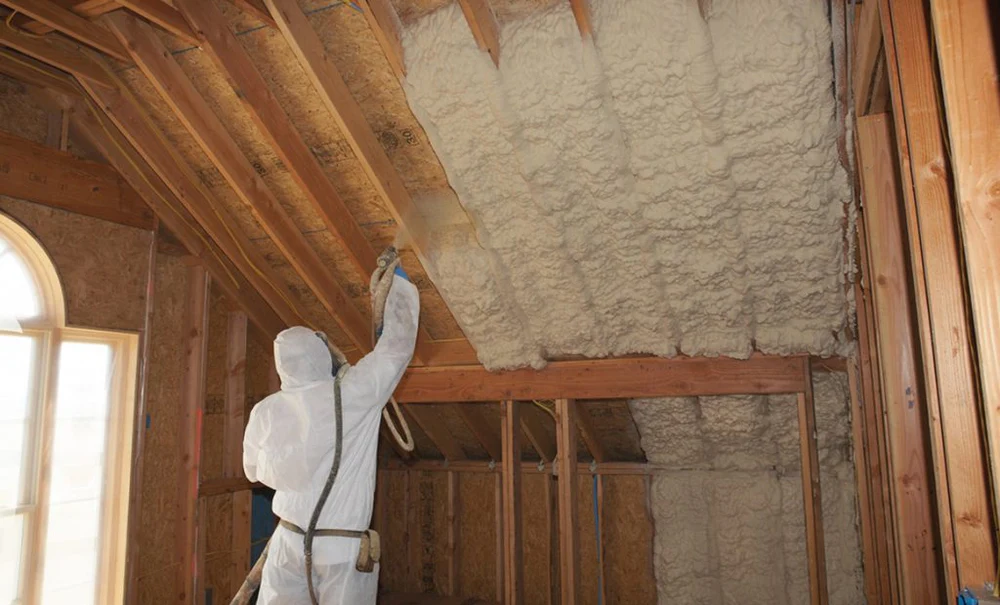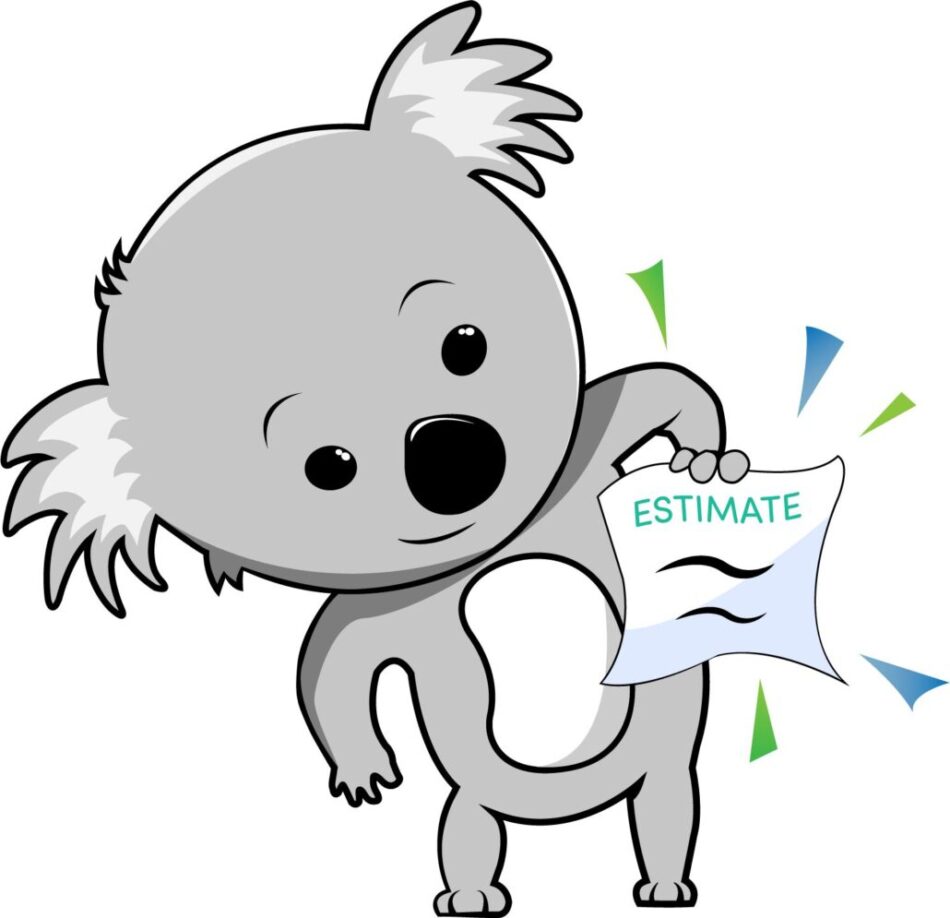Cost of Spray Foam Insulation

2024 Spray Foam Insulation Cost Guide: Budgeting Tips & Estimates
Curious about spray foam insulation cost in Colorado? This guide will help you understand the factors that influence the price and how to plan your budget effectively with Koala Insulation.
Key Takeaways
- Spray foam insulation costs vary based on foam type, thickness, area size, stud depths, and many other factors. On average costs ranging from $.95 to $1.50+ per board foot. A board foot is one square foot, one inch deep. Spray foam is measured and priced off the depth of the insulation.
- Labor and installation expenses can significantly impact the overall cost, with professional installation costing between $2,500 & up.
- DIY options are generally not available nor recommended as spray foam is a chemical that requires expertise and very extensive training.
- Location-specific costs for spray foam insulation, such as attic, basement, and garage insulation, differ widely, with additional considerations for existing insulation removal, mold remediation, and vapor barrier installation affecting total expenses.
Understanding Spray Foam Insulation Costs
Spray foam insulation costs can vary significantly based on several factors, including the type of foam used, the thickness required, and the size of the area to be insulated. The spray foam cost is often higher compared to traditional insulation types like fiberglass batts, mineral wool, and blown-in/loose-fill insulation. On average, the foam insulation cost of spray foam insulation ranges from $.95 to $1.50 per board foot.
Getting a grasp on these variables will assist in a more precise estimation of your project’s budget.
Cost by Type of Spray Foam
The type of spray foam you choose greatly influences the overall cost. Spray foam costs can be broken down into cost per square foot and cost per board foot for both open-cell and closed-cell spray foam. Open-cell spray foam insulation tends to be less expensive, with costs ranging from $.75 to $1.25 per board foot. This type of foam is ideal for interior applications where soundproofing and flexibility are crucial. Open-cell spray foam should never be used in Colorado or other regions with varying climates and moisture levels.
On the other hand, closed-cell spray foam insulation ranges from $.95 to $1.50 per square foot. Closed-cell foam provides higher R-values and better moisture resistance, making it suitable for exterior applications and areas prone to dampness. Assessing the benefits in relation to costs is key in deciding the type that best fits your needs.
Thickness and R-Value Impact
The cost of insulating a house with spray foam depends on several factors, including the size of the house and the type and thickness of the foam. Here are some general guidelines:
- Thicker applications of spray foam require more materials and labor, thus increasing the overall expense.
- The cost of insulating a 2,000-square-foot house can range from $15,000 to $50,000, and even higher in some cases.
- The total expense varies based on factors such as the type of foam and the required thickness.
Higher R-value insulations like closed-cell spray foam are more costly due to their superior insulating properties. Local building codes may also affect costs, as different regions require varying R-values for compliance.
Area Size and Coverage
The size of the area to be insulated is directly proportional to the overall cost. Larger areas require more materials and labor, with costs typically ranging between $1.00 and $1.25 per board foot. For example, insulating a 30-foot by 50-foot metal building with a 2-inch layer of closed-cell spray insulation can cost between $3,500 to $5,000 for professional installation.
Spray foam insulation installations are generally priced by the board foot, and the cost tends to be higher in colder regions due to the need for more insulation material. A clear comprehension of these factors will enable you to devise a more efficient budget plan. As a reminder, building codes in Colorado tend to require properties to have R-21 for exterior walls, and R-60 for exterior facing ceilings/attics.
Closed-cell spray foam has an r-value of 7-7.5/inch. So, most homes in Colorado would be required to have 2.8-3 inches on their walls (R-21), and 8.1-8.6” on their ceilings (R-60).
Labor and Installation Costs
Labor costs for installing spray foam insulation can vary widely based on the project’s size and complexity. An insulation contractor typically charges between $75 to $200 per hour. The total cost for professional installation can range from $2,500 at a minimum and higher, depending on the project’s scope.
Location-Specific Costs
The cost of spray foam insulation can vary depending on the specific area within the home being insulated. For example, attic insulation typically costs between $5,500 to $30,000, while garage insulation can range from $2,500 to $10,000.
Attic and Roof Insulation
Insulating an attic or roof with spray foam can cost anywhere from $5,000 to $30,000.
Basement and Crawl Space Insulation
Basement insulation costs typically range from $2,500 to $8,500 for a 1,000-square-foot area. Crawl space insulation is slightly less expensive, with costs ranging from $2,500 to $5,000 depending on the size and complexity of the space.
Wall and Garage Insulation
Wall insulation costs between $.95 and $1.50 per board foot, with the total cost for a 1,000-square-foot wall area ranging from $2,850 to $4,500.
Garage insulation costs can vary widely, from $2,500 to $10,000, depending on the garage size and insulation type.
Comparing Spray Foam Insulation to Other Types
While spray foam insulation entails a higher initial cost than traditional insulation types like fiberglass batts, cellulose, and rock wool, its long-term energy savings and other benefits can compensate for the upfront investment.
Fiberglass Insulation
Fiberglass insulation is cheaper, costing between $0.80 to $2.75 per square foot. However, it offers lower R-values compared to spray foam, making it less effective in extreme temperatures.
Rock Wool and Blown-In Insulation
Rock wool insulation costs between $1.90 to $2.50 per square foot and provides excellent fire resistance and soundproofing.
Blown-in insulation offers better coverage in irregularly shaped areas, making it a good alternative in certain situations.
Long-Term Cost Benefits of Spray Foam Insulation
Even with a higher initial cost, spray foam insulation brings substantial long-term advantages like energy savings, home value enhancement, and maintenance cost reductions.
Energy Efficiency Savings
Spray foam insulation can reduce energy bills by up to 29.5% by sealing air leaks and improving overall home energy efficiency.
Increased Home Value
Homes with spray foam insulation are more attractive to buyers due to their energy efficiency, potentially increasing the home’s resale value by 5-10%.
Reduced Maintenance Costs
Spray foam insulation reduces the workload on HVAC systems, leading to lower maintenance and repair costs over time.
Tips for Reducing Spray Foam Insulation Costs
There are several ways to reduce the overall costs of spray foam insulation, from timing the installation to seeking rebates and incentives.
Timing Your Installation
Planning your insulation project during off-peak seasons like fall or spring can help reduce costs due to lower demand.
Combining Projects
Combining spray foam insulation with other home improvement projects can save on labor costs and potentially secure package deals from contractors.
Taking Advantage of Rebates and Incentives
Many utility companies and state programs offer rebates and incentives for energy-efficient home improvements, including spray foam insulation.
Finding a Reputable Spray Foam Insulation Contractor
For a successful spray foam insulation project, selecting the right contractor is crucial. Here are some tips to help you find a trustworthy professional.
Research and Reviews
Start by researching local contractors and reading online reviews on trustworthy sites like Google. Recommendations from friends and family can also be invaluable. Consider researching your local chamber of commerce or BNI groups to see who is present within your community. At Koala Insulation, we pride ourselves on our positive reviews and satisfied customers.
Certifications and References
Ensure you choose a certified contractor with the necessary licenses to install spray foam insulation. Certain insulation manufacturers only distribute their products to licensed professionals, ensuring access to high-quality materials and services. Koala Insulation is fully certified and licensed, guaranteeing top-notch workmanship and materials for your project.
Comparing Quotes
It generally is always good practice and understandable to solicit quotes from a few contractors. However, it is very important to make sure that when comparing estimates that you know for certain they are apples-to-apples comparisons of one another. By and large, if you get a few quotes and one is too good to be true, while tempting, it’s best to throw that one out. Make sure each quote includes an itemized budget detailing:
- What foam is used?
- What are the spec sheets and tech data sheets for that foam?
- Materials
- Labor – experience, years on job, years with company, etc.
- Permits
- Fees
When investing in Spray Foam, selecting the cheapest option only based on the estimate quoted is a dangerous game. Selecting a contractor who understands the severity of the product and work is the most important and safe way to ensure that your project goes smoothly.
Summary
Understanding the costs associated with spray foam insulation can help you make informed decisions and effectively budget for your project. From the type of spray foam and area size to labor costs and additional expenses, multiple factors influence the overall cost.
While spray foam insulation may have a higher upfront cost compared to traditional insulation methods, its long-term benefits make it a worthwhile investment. These benefits include:
- Energy Savings: Spray foam insulation can significantly reduce your energy bills by providing superior insulation and air sealing.
- Increased Home Value: Homes with spray foam insulation are more attractive to buyers due to their energy efficiency and durability.
- Reduced Maintenance Costs: Spray foam insulation minimizes the workload on HVAC systems, leading to lower maintenance and repair costs over time.
By timing your installation, combining projects, and taking advantage of rebates and incentives, you can further reduce costs and maximize your investment with Koala Insulation.
Ready to start your insulation project? Contact Koala Insulation today for a free estimate and consultation. Let us help you achieve energy efficiency and comfort in your home. Visit our website or call us now to learn more!
Frequently Asked Questions
What is the average cost of spray foam insulation per square foot?
The short answer is it depends. The long answer is that spray foam is estimated off of ‘board feet’ not square feet. A board foot is 1 square foot, 1 inch deep. So, board feet takes volume into consideration versus just surface area. For example, an area that is 10×10 = 20 square feet. However, if you need 3 inches of closed-cell spray foam installed (R-21), the board feet calculation is 10x10x3=60 board feet. Closed-cell spray foam is generally $.95-1.50 per board foot. The larger the project, the more discounted the board foot price unit is.
Is spray foam insulation worth the investment?
Yes, spray foam insulation is worth the investment as it offers significant energy savings and can increase home value.
Can I install spray foam insulation myself?
DIY solutions, while potentially available, are an imperfect and dangerous solution. Professional installation ensures quality, efficiency, and safety.
How do regional factors affect spray foam insulation costs?
Regional factors such as climate, local rules, and market competition influence spray foam insulation costs. Higher cost of living areas may have higher labor costs, while urban areas with more competition may have lower prices.
Are there any additional costs I should consider?
Yes, additional costs to consider may include removing existing insulation, mold remediation, and installing vapor barriers. These can significantly add to your project costs.
Find Your Location


Get a quote


